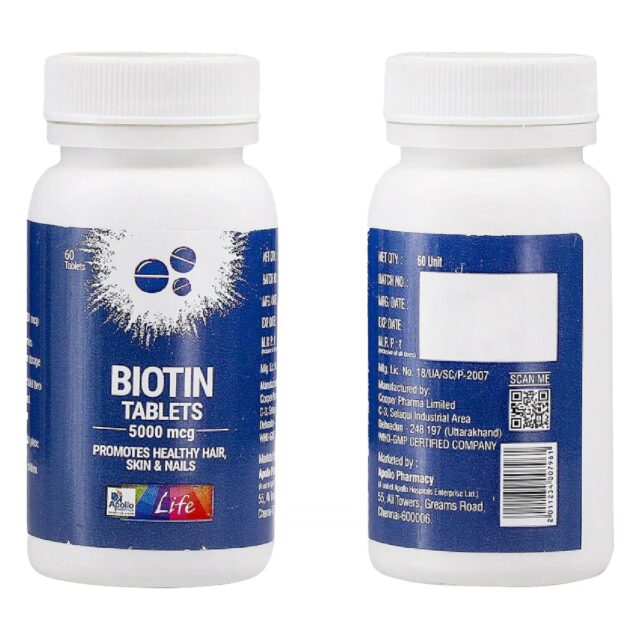Biotin belongs to the vitamin B family, which is essential for converting food into energy and supports skin, nail, and hair health.
Biotin, also known as vitamin B-7 or vitamin H, is a water-soluble B vitamin that helps our body function optimally. This type of vitamin is not stored in the body, so people need to get them from their diet on a regular basis. Biotin is also essential for the functioning of several enzymes including carboxylases. These enzymes help in metabolic processes, such as the production of glucose and fatty acids.
Biotin deficiency is rare but it can occur in people with certain medical conditions, such as malabsorption disorders or liver disease. It can also occur in pregnant women and people who drink excessive alcohol. Symptoms of biotin deficiency can include fatigue, hair loss, skin problems, and brittle nails.
If you think you may have low levels, it is essential to consult a doctor. The deficiency is usually treated by diet modification and biotin capsules.
Why is Biotin Essential?
- Diabetes Management: Biotin helps regulate blood sugar levels. It supports insulin production. Taking it can be beneficial for people suffering from type 2 diabetes.
- Hair Health: For healthy hair growth, biotin is important. It helps produce keratin, a protein that improves your hair quality. Low levels can lead to hair loss and brittle hair.
- Skin and Nail Health: Our body needs biotin to maintain healthy skin and nails. It helps produce collagen, the protein that provides our skin strength and elasticity. Low levels of biotin can lead to dry skin, scaly rashes, and brittle nails.
- Prenatal Health: Pregnant women need biotin for the proper development of the baby’s nervous system. Reduced levels can lead to birth defects.
- Multiple Sclerosis: Biotin may be beneficial for people with multiple sclerosis. It is a disease that damages the myelin sheath, which otherwise protects nerve cells. Biotin helps to produce myelin enzymes, which can help to prevent further damage to nerve cells.
Amounts and Dosage of Biotin
The recommended dietary allowance (RDA) for biotin depends on age and sex. For adults, the RDA is 30 micrograms (mcg) per day. Pregnant women need 35 mcg per day, and lactating women need 30 mcg per day.
Food Sources of Biotin
Biotin or vitamin B7 is found in numerous foods, including:
- Eggs
- Meat
- Seeds
- Nuts
- Fish
- Vegetables
If you are getting enough biotin from your diet, you should not need a supplement. However, if you are concerned about your intake or have a medical condition that increases your risk of deficiency, talk to your doctor about whether a biotin capsule is right for you.
Symptoms of Biotin Deficiency
Although biotin deficiency is uncommon, it may manifest through symptoms such as:
- Hair loss
- Dry skin
- Cracks at the corners of the mouth
- Swollen tongue
- Dry eyes
- Loss of appetite
- Depression
- Insomnia
Causes of Biotin Deficiency
Biotin deficiency can be caused by several factors, including:
- Medications: Some medications, such as antibiotics and anti-seizure drugs, can interfere with the absorption of biotin from food.
- Intestinal problems: Conditions such as Crohn’s disease and colitis can damage the small intestine, which can impair the absorption of the vitamin and other nutrients.
- Dietary restrictions: Following a restrictive diet, such as a vegan or vegetarian diet, can increase your risk of biotin deficiency.
- Biotinidase deficiency: This rare inherited disorder prevents the body from recycling biotin. This can lead to deficiency, even if you eat a healthy diet.
- Intravenous (IV) feeding: People who receive IV feeding for a long period of time may not get enough biotin from their feedings, which can lead to deficiency.
If you think your body has a deficiency due to the above factors, it is important to see a doctor. Your doctor can help you treat it with the biotin capsules.
In conclusion, Biotin is a B vitamin that is essential for many bodily functions, including the metabolism of carbohydrates, fats, and proteins. Its deficiency can cause skin, hair, and nail problems. Pregnant or breastfeeding women may require a high dosage of this vitamin. Anyone with a deficiency can increase their intake by consuming foods rich in this vitamin or taking biotin capsules after consulting a doctor.
References: https://health.clevelandclinic.org/benefits-of-biotin/
https://www.hsph.harvard.edu/nutritionsource/biotin-vitamin-b7/
https://www.mountsinai.org/health-library/supplement/vitamin-h-biotin
Syndicated press content is not written by ED Times
Read More:
Sage Good: Redefining Quality with Sustainability at the Core
































